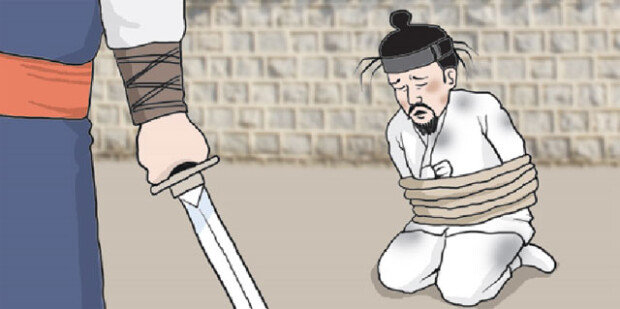Prisoner of war executed at home
Prisoner of war executed at home
Posted March. 19, 2019 07:44,
Updated March. 19, 2019 07:44

It was during the early years of the Japanese Invasion into Joseon in 1592. The Joseon royal court struggled much as it had no intelligence on the Japanese forces. It did not even know the rough size of Japanese army when it was making a request for reinforcement from the Ming Dynasty. Joseon’s request must have been confusing for the Ming Dynasty as well, because they could not figure out how many soldiers were needed for the Joseon government.
Meanwhile, a Joseon official, who had been taken as prisoner of war by Japan, escaped with valuable information. Harnessing his great social skills, the official worked hard to earn a great deal of trust from the Japanese soldiers. Making friends with some of them, the official overheard the amount of rice consumed each day by Japanese soldiers. When divided by a single portion, the volume of rice could be calculated into the total number of the Japanese army.
A Japanese general set the official free when a Joseon delegation visited Japan. Returning home, the official reported the intelligence to the Joseon government. King Seonjo wanted to get information from him, but he faced opposition from his ministers. Under the military law, there was no such a thing as prisoner of war. Being a prisoner meant surrender, which was dealt with by death penalty. The ministers were quick to handle him with the capital punishment. The king wanted to get information first but with little avail. The official was summarily executed.
Why the hurry? It would be unreasonable to assume that the ministers didn’t have enough commitment to save their country at such a crucial juncture. The probable conclusion would be that the ministers actually believed that killing the official was vital to win the war. In other words, showing no mercy to those who succumbed and setting an example of it was much more important than such as trivial information.
Of course, their fear is understandable as many more could have followed suit of the official by giving in to the Japanese army. However, it is almost spooky if their decision was made based on some abstract values such as philosophies and creeds, rather than reality check. Pursuing values over practical gains would be desirable if not respectable if we were talking about individual life. Running a country, however, is all about facing reality. The reality of international relations and war is even much fiercer than running a country. Putting values and ideas on the front burner will drive a country and its people into a hardship that is simply irreparable.
Eun-Taek Lee nabi@donga.com







